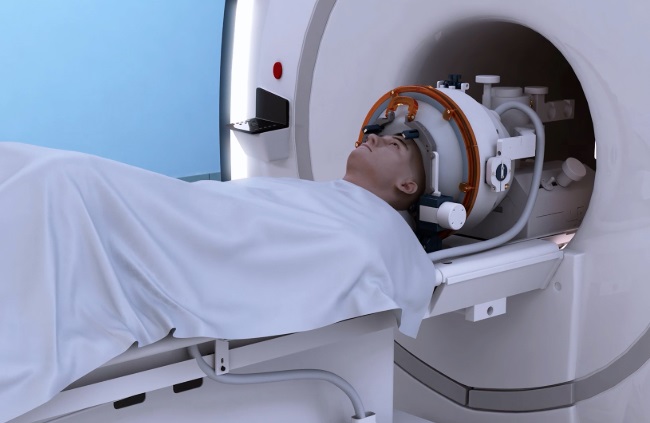Nikhil Prasad Fact checked by:Thailand Medical News Team Feb 06, 2025 2 months, 1 week, 3 hours, 2 minutes ago
Medical News: A new wave of medical innovation is emerging in the fight against brain tumors. Researchers from the University of Miami Miller School of Medicine, Florida-USA and Nicklaus Children's Hospital, Florisa-USA are exploring focused ultrasound (FUS) as a potential breakthrough treatment for both adult and pediatric patients. This non-invasive technology offers hope to those battling aggressive brain tumors, particularly when traditional treatments fail.
 Clinical Trials of Focused Ultrasound for Brain Tumors Show Promising Potential
Clinical Trials of Focused Ultrasound for Brain Tumors Show Promising Potential
Focused ultrasound is a cutting-edge method that uses targeted ultrasonic waves to either directly destroy tumor cells or temporarily disrupt the blood-brain barrier (BBB) to enhance drug delivery. Scientists have been particularly interested in its potential to improve treatment outcomes for conditions like glioblastoma (GBM) in adults and diffuse intrinsic pontine glioma (DIPG) in children. However, a clear understanding of ongoing clinical trials investigating this promising approach has been lacking.
This
Medical News report highlights the findings of a recent study that reviewed all clinical trials registered on ClinicalTrials.gov that focus on FUS as a treatment for brain tumors. The researchers identified 30 clinical trials that are testing FUS in different ways, offering new possibilities for treating some of the most difficult-to-manage brain tumors.
Key Findings of the Study
The study reviewed clinical trials conducted worldwide, with most of them based in North America. Researchers found that 80% of the trials focused on adult patients, while 17% were exclusively for pediatric patients. The remaining 3% included both age groups.
Among the tumors studied, glioblastoma was the most common, making up 47% of all trials, followed by DIPG, which accounted for 17%. Other trials focused on general brain tumors and metastatic brain tumors.
A significant 87% of trials listed safety as their primary focus, ensuring that FUS does not pose undue risks to patients. Other primary outcomes included radiographic responses to treatment (10%) and diagnostic improvements (3%).
In terms of progress, 40% of the trials were actively recruiting participants, while 10% were active but not recruiting. Another 20% had already been completed, and the rest were either not yet recruiting or had unknown statuses. Notably, while no official results have been published yet, early reports suggest that FUS is a safe procedure with promising potential.
How Focused Ultrasound Works
There are two primary ways FUS is being investigated for brain tumors. One approach uses high-intensity focused ultrasound to destroy tumor cells, similar to radiation therapy but without harming surrounding tissue. The other approach uses low-intensity ultrasound to temporarily open the BBB, allowing chemotherapy drugs to penetrate the brain more effectively.
Many of the trials in the study are testing FUS in combination with chemotherapy. Some of the drugs bein
g tested include temozolomide, carboplatin, and bevacizumab. By allowing these drugs to reach brain tumors more effectively, FUS could potentially enhance the effectiveness of existing treatments.
Geographic Distribution and Industry Support
Most of the trials were coordinated in the United States, which accounted for 50% of the studies. Canada followed with 23%, while other trials were based in Italy, France, Switzerland, Taiwan, and South Korea. The researchers also noted that 67% of the trials received funding from industry sources, showing strong support for advancing this technology.
The study revealed a growing interest in using FUS not just for therapy but also as a diagnostic tool. One trial is exploring whether FUS can help detect circulating tumor DNA (ctDNA) in blood and cerebrospinal fluid, potentially improving brain tumor diagnosis. If successful, this approach could provide a less invasive way to monitor tumors and guide treatment decisions.
What Lies Ahead for Focused Ultrasound in Brain Tumor Treatment
While FUS has already been approved for treating tumors in other parts of the body, its application in brain tumors is still in the early stages. No clinical trial has yet published official results, but anecdotal evidence suggests that the technology is safe and could be highly effective.
Researchers anticipate that the next phase of trials will focus on optimizing treatment protocols, such as the number of FUS sessions required and the best combination with chemotherapy. As more trials are completed, we may soon have a clearer understanding of how FUS can be integrated into routine brain tumor treatment.
Conclusion
The study highlights the potential of focused ultrasound as a revolutionary treatment for brain tumors. By offering a non-invasive, targeted approach, FUS could significantly improve outcomes for both adult and pediatric patients. As trials progress, researchers hope to confirm its safety and effectiveness, potentially making it a standard part of brain cancer therapy.
While the long-term effects of FUS remain unknown, its ability to enhance drug delivery and offer a less invasive alternative to surgery makes it an exciting area of research. Future studies will determine whether FUS can serve as a standalone treatment or work best in combination with chemotherapy.
The study findings were published in the peer-reviewed journal: Cancers.
https://www.mdpi.com/2072-6694/17/3/513
For the latest on Brain Cancers, keep on logging to Thailand
Medical News.
Read Also:
https://www.thailandmedical.news/news/swiss-researchers-unveil-new-insights-into-the-role-of-mirnas-in-glioblastoma-development-and-treatment
https://www.thailandmedical.news/news/the-phytochemical-farnesol-suppresses-glioma-cell-growth-and-promotes-apoptosis
https://www.thailandmedical.news/news/malaysian-and-australian-oncologists-explore-abc-transporters-and-their-role-in-glioblastoma-drug-resistance
https://www.thailandmedical.news/news/doctors-warn-of-rising-cases-of-glioblastoma-multiforme-in-the-united-states
https://www.thailandmedical.news/articles/cancer
